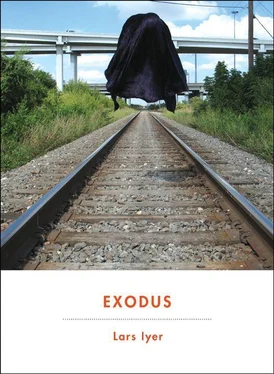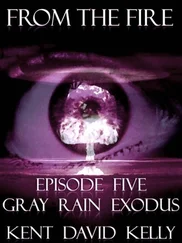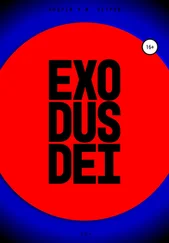I stumbled when I tried to convey it to W., when I tried to explain what Kafka revealed to me in my warehouse years. I spoke of the castle hill, veiled in mist and darkness, and of the buzzing and whistling on the telephone line. I spoke of the illusory emptiness into which K. looked up as he crossed the wooden bridge, and of his weariness, which made him collapse on the way to settle his business with the authorities. What was I getting at? W. wonders. What was I trying to say?
The world around me was unreal, I told W. that. The warehouse was unreal. The suburbs in which I had grown up, and on which the warehouse had been built, were likewise unreal. Despair reveals the truth of the world: isn’t that what was shown to me by Kafka? Suffering reveals the nullity of things .
I had a vision, I told W., he remembers. I saw the workers around me like rats in a rat-run. I saw the pristine buildings around me like rat-pens, like rat-mazes. Absurdity was doing experiments on us: that’s what I saw, wasn’t it? Madness had us caged in the suburbs like laboratory rats …
My soul was a UTL: isn’t that what I saw? Life was an unable-to-locate, although no one seemed to know it but me.
The Castle made my life quiver like a compass needle. Things pointed in one direction: north! Out of the warehouse! Out of the south! North: to where dereliction, like The Castle , revealed things in their truth! North: to where the destruction of the created order had worn through! To where reality had worn through!
Where have the homeless gone, who used to sleep under the bridge at Waterloo? W. wonders. Doubtless, they were blasted awake by hoses at three or four in the morning. Doubtless they were moved on by the new security guards, the private police of Capital …
We’ve seen them, in our home cities, of course: the Business Improvement Officers , in their fluorescent vests, walkie-talkies squawking. We’ve seen them patrolling the Newcastle streets in teams, ensuring a clean and safe trading environment by moving undesirables away. We’ve seen them safeguarding the marketing and branding of the area by breaking up groups of teenagers and moving on the homeless in Plymouth shopping malls.
There’s to be no loitering in the privatised city centre (but there’s nowhere to loiter). No sitting down (but there are no benches on which to sit down). There are to be no non-consumers in the new imperium. That’s why the Business Improvement Officers are out with their hoses in the early hours of the morning. That’s why they’re keeping watch through CCTV for any non-consumerist behaviour .
Waterloo Bridge. The mighty Thames.
Bridges are offensive to the gods, W.’s read. They’re the symbol of hubris, of over-striving. Who would think themselves stronger than the currents and tides?
The gods of the river need to be appeased, W. says. The Greeks used to suspend animals over the river and then cut their throats. They used to throw live horses into the waters, or sacrifice them on the banks. The pagans had the tradition of sacrificing children to appease the river. W. shudders.
The Thames is full of all kinds of offerings: jewellery and figurines, spear-heads and battle axes, mutilated pagan deities, crucifixes with the head of Jesus removed, lying perfectly preserved in river-bottom silt …
Should we throw ourselves in? we wonder, looking down at the restless, heaving water. Ah, but the river wouldn’t want us. We would appease the wrath of no god, we who are neither innocent, like children, nor full of life, like horses. We’d be pulled up from the waves, the polluted water pumped from our stomachs. They’d slap us round the face. Wake up! Wake up! And W.’s eyes would open and see me. And he’d retch up the black river water from the bottom of his lungs.
Somerset House. The vast courtyard. Pavilions and porticos. Posh people eating lunch in the sun. He knows I didn’t want to come here, W. says. He can see that I am uncomfortable in such grand surroundings. The working class are only happy in squalor. But W. wouldn’t be deterred from going to Somerset House. He wanted to see the fountain, he says. He wanted to see the jets of water rising and falling. And he wanted to see me caper among those jets like an idiot child.
The bottle of wine that we ordered arrives, with two glasses. — ‘To us!’, toasts W. To idiocy! I toast. How do I think our lecture tour is going? W. asks. Are we coming through with our reputations intact? Our dignity? Have we gained in stature in the eyes of our contemporaries? Ah, there’s no need to answer.
This is our last tour, W. says. He feels that strongly. Something’s going to happen. Something’s about to happen … Why does he feel such a sense of dread?
In his dreams, we’re on the beach, and the sea’s out, sucked out, as it is before a great wave comes, W. says. But only he knows the tsunami’s coming. Only he knows, and no one will listen to him. And there I am, inflatable around my midriff, running down the beach towards the sea …
There’s nothing left for us, W. says. Nothing left to do except drink and dance. He’ll drink, W. says, and I’ll dance. — ‘Go on, fat boy, dance!’
In these times, we should be cultivating an aristocratic detachment , W. says. We should retire from the fray like Roman Stoics, holing up on our country estates while the empire crumbles … — ‘But we haven’t got country estates!’, W. says. We haven’t.
Should we order another bottle? — ‘Of course we should!’ W. learned it from Debord, from Bacon: the art of luxurious dining at the end of times. He’s read of Debord, in his later years, in his luxurious apartment on the rue du Bac, spending whole days planning elaborate meals and choosing fine wines. He was a ‘ warrior at rest ’, Debord said of himself. He’d ‘ lain down his arms ’, he’d had enough. ‘ This century does not like truth, generosity, grandeur ’, Debord wrote. And Bacon left painting behind in 1935, and gave himself over to champagne, promiscuity and gambling. To a ‘ furious frivolity ’, as his biographer puts it, to living a ‘ grand style of existence …’
Let’s order some sandwiches, too, we agree.
Upstairs in Foyles , looking through the philosophy books.
‘Do you think they’ll have our books here?’, W. asks, knowing the answer. ‘Of course not!’ His book went out of print as soon as it was published. Before it was published! His publisher went bust. And my books — my so-called books — appeared in the most obscure of imprints, by the most obscure of presses, at a price affordable only by the most prosperous libraries. Our books will have no effect whatsoever! They’ll have no readers!
Ah, but he still believes, deep in his heart, that our collaboration might lead to something great, W. says. That’s what keeps him going, even if all the evidence is to the contrary. Why can’t I see it? Why have I given up on him? On us ?
‘When are you going to take philosophy seriously?’, W. says. ‘You haven’t read anything in years. Are you retiring from philosophy?’, he asks. ‘Have you given up?’ I haven’t, I tell him. — ‘Then why don’t you write some philosophy? You have to externalise yourself. You have to experience your shortcomings’.
I show W. a book of photos of Deleuze and Guattari from the ’70s, with their flares and long hair. Look at them! They were having a good time! — ‘They had ideas’, W. says. ‘They were changing the world’.
The Idiot’s Guide to Deleuze … Deleuze for the Simple … Deleuze as Pabulum , in the Pre-chewed Philosophy series, and Deleuze in Bullet Points in the Lowest Common Denominator series. Ninny Deleuze , in the Reducing Everything to Common Sense series. Deleuze Vivisected , in the Yet More Books Explaining Deleuze series … — ‘Do you think there are enough introductory books to Deleuze?’, W. asks. But Deleuze is hard , I point out. Deleuze is hard, W. says. Philosophy is hard! It shouldn’t be made any easier!
Читать дальше












